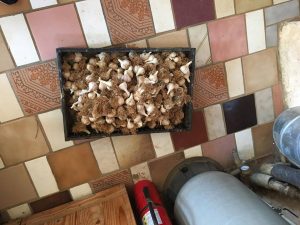“We try to increase how much we can do in the non-cash economy, so the farm fulfills that in having this abundance. We always have something extra that we can use for trading. By the way, if you want, take some sweet potatoes home. There’s a lot of things we always have way too much of. We’re happy to give it away.” – Debbie Piesen, cofounder and farm manager at LEF

A tray of garlic harvested from LEF’s gardens. Photo: Maureen Sullivan
Along with seeds, LEF grows more food than the group is able to consume. They use the excess crops for bartering, particularly with their neighboring community, Twin Oaks. This was the home of all four current adult members of LEF before the project began. Founded in 1967, Twin Oaks is an established community of around 100 members that values “egalitarianism, ecology, and nonviolence.” Its economy is supported by tofu production, furniture crafting, and indexing books.
“[At Twin Oaks,] our work schedules of 44 hours each week are very flexible. In return for member’s labor, the community provides all basic needs, including housing, food, clothing, etc. Twin Oaks has an intricate community culture.” via Fellowship for Intentional Community
Though LEF does not have a set work schedule, they participate to some degree in Twin Oaks’ labor system through bartering and labor exchange. Thoreau states in “Walden” that “the cost of a thing is the amount of what [he] will call life which is required to be exchanged for it, immediately or in the long run” (par 45). This rough equation is used in determining the worth of food grown at LEF as well as the worth of various services provided by community members.
For example, the way current LEF member Misha Nikitin first became involved with the project was through an agreement that Twin Oaks members could receive community credit for construction work at nearby developing communities. Additionally, Piesen works childcare shifts at Twin Oaks in exchange for her daughter to be a part of their homeschool co-op.